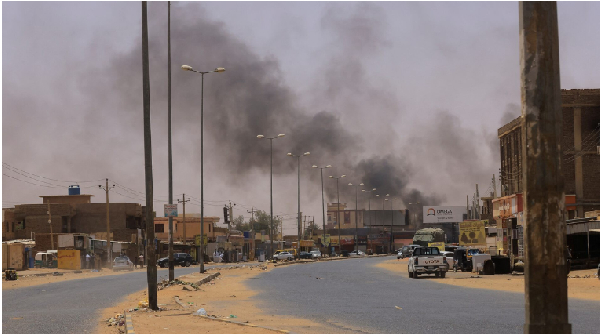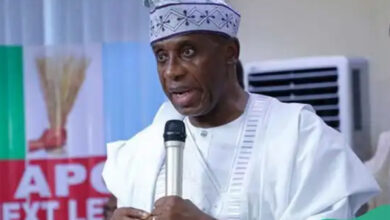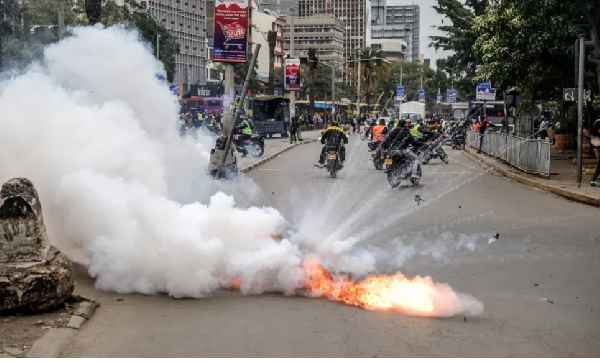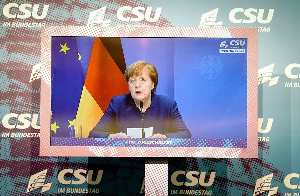News Africa
Beyond Putin and Macky Sall’s Phone Conversation
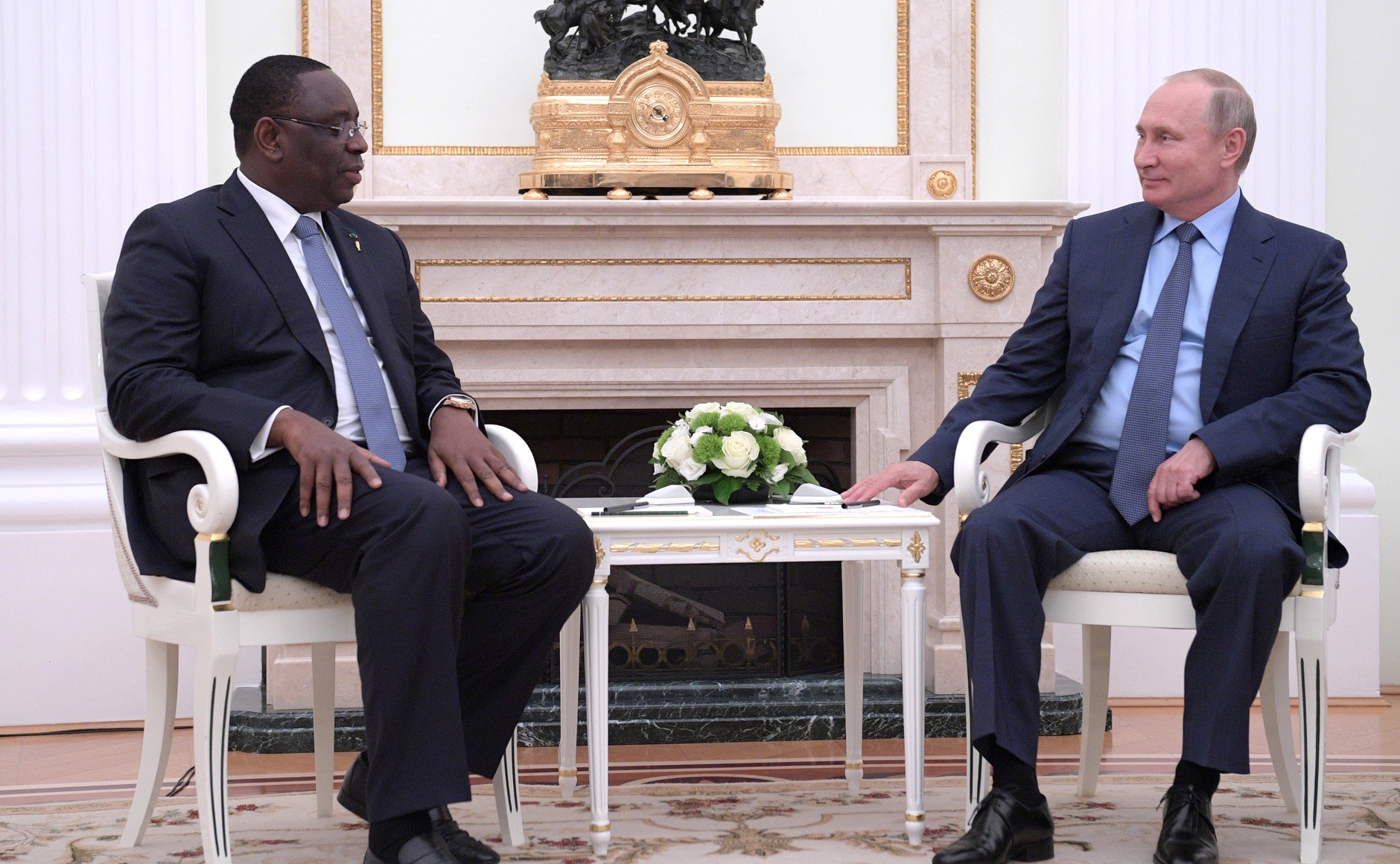
It started only few years ago, the unexpected speed of Russia’s return journey to Africa. Russia commenced deepening ties with African countries following sanctions imposed on it by the United States and Europe in 2014. It has, with the toughest speed, been dealing with French neocolonialism on the continent – from Central African Republic and has moved to West Africa. Under its armpit are Burkina Faso, Chad, Guinea, Guinea-Bissau, Mali and Niger. Due to the geopolitical dynamics, Russia is further penetrating beyond the Sahel into Senegal on the Atlantic Ocean coastline.
Senegal is notably the westernmost country in the mainland with untapped resources, has a population of above 17 million. Sharing the same territorial border with Guinea-Bissau and especially the Republic Mali, Senegal presents some strategic features for Russia’s fundamental aspirations for uprooting more than a century-old French domination in the region. Across West African region, Russia views persistent neocolonial tendencies as a threat to its multifaceted bilateral relations and therefore has engaged in a fierce confrontation with France.
On Nov. 13, Russian President Vladimir Putin and his Senegalese counterpart Macky Sall held a phone conversation as a follow up to their discussions during the second Russia-Africa summit in St. Petersburg. “As a follow-up to the contacts held as part of the second Russia-Africa Summit in St. Petersburg, the parties discussed key issues of Russian-Senegalese cooperation, including the prospects for the further development of trade, economic and investment ties. They expressed their mutual commitment to intensifying joint work in this field,” the Kremlin press service said.
At the plenary session of the late July summit, Putin was upbeat with his emotional discussions over Africa’s huge resources and, at the same, reiterating the historical Soviet’s tremendous role in the liberation struggle on the continent, and emphasized the skyline readiness to support Africa with Russian technology including nuclear plants as well as ensuring food security.
“I would like to emphasize once again that we are sincerely ready to work towards a better future together, hand in hand with our African friends, building genuine strategic cooperation and partnership. We appreciate relations with each African nation and the continent in general. We are confident that a bright future exists for these relations in the emerging multipolar world,” the Russian head of state stressed, according to the transcript posted to Kremlin website.
For this article, it is necessary to analyze the objective situation on the ground. The reality is that African leaders have only achieved relatively little success with their energy security, primarily due to multiple factors including their own lack of explicit vision to pursue opportunities in energy sector with absolute seriousness and with vigour. As a result, Putin also announced that more than 30 energy projects, with a combined capacity of approximately 3.7 gigawatts, are currently in progress with various African countries.
Winning Africa’s sympathy is easy. Just replay old-Soviet songs, recite cliches such as anti-Western slogans, then shout international friendship and solidarity. And the appreciative, irreversible promise of free, ‘no-cost deliveries’ of grains does the trick the most, plus the usual colorful rhetoric and policy platitudes. The supply of grains was, indeed, a public promise made to an applause during the Russia-Africa parliamentary conference back in March 2023, but has still not been delivered to the six African countries: Somalia, Central African Republic, Burkina Faso, Zimbabwe, Mali and Eritrea.
Moscow had written off $23 billion of Africa’s debt, Putin said during the St. Petersburg summit, without explaining further what time period or naming the countries involved. By legal definition, Africa is not a country. Africa is a continent consisting 54 states, therefore entire Africa did not owe Russia debts. In practical terms, only a number of African states who were supplied with military equipment, arms and weapons during the Soviet times, and this debt was declared written off (cancelled) several years ago.
At least if it was even not earlier, the question of debt write-off (called it the Russia’s ‘debt song’) have repetitively been mentioned over a decade. On 27 March 2013, in Durban, in a speech at meeting with heads of African states, Putin explicitly noted “Over the course of many decades, Russia has provided direct assistance to the African continent. I would like to note that we have written off over 20 billion dollars in debt; we have written off far more than any other G8 nation. We plan to take additional measures to ease the debt burden.”
During the Soviet era, Moscow forged alliances with African countries, especially those that supported its communist idealogy, and supplied them with military equipment and offered technical assistance on bilateral basis. In particular, these supplies went to Angola, Algeria, Democratic Republic of Congo (DRC), Ethiopia, Namibia, Mozambique, Morocco and South Africa. That Soviet-era form of diplomatic engagement left those African countries indebted to an amount of $20 billion, according to Kremlin’s documents.
Using that platform for promoting comprehensive Russian interests, Putin hailed Africa’s role in the emerging “multipolar world order,” noting that “the era of hegemony of one or several countries is receding into the past, albeit not without resistance on the part of those who got used to their own uniqueness and monopoly in global affairs.”
According to Putin, Moscow stands ready to bolster defense ties with African countries by helping train their military and expanding supplies of military equipment, some of them on a no-cost basis. For regional stability, Russia continues to deploy Wagner forces in Africa, despite Wagner mercenaries have allegedly caused havoc in many countries in Africa and been accused of human rights atrocities and war crimes on the continent. But preliminary research indicates that Russia has military agreements with 35 African countries. Further, basic research shows that the Senegalese military receives most of its training, equipment, and support from France and the United States, and to a lesser extent Germany.
For over a decade, Moscow has been the largest arms seller to more than eighteen African countries in the continent, with just under half of Africa’s total military imports being Russia’s attractive, cheap, and low-premise weapons. The biggest arms buyers are Algeria, Angola, Burkina Faso, Egypt, Ethiopia, Morocco, and Uganda. Companies like Rosoboronexport have signed billion-dollar contracts.
Some African nations are questioning whether Russia is the heavyweight economic partner it claims to be. For instance, Russia’s 2019 pledge to double trade with African nations to $40 billion has so far fallen flat, with total trade amounting to only around $18 billion since then. A significant percentage of that trade is with just four countries: Algeria, Egypt, Morocco and South Africa.
On concrete cooperation with Senegal, in July 28, 2023 at the St. Petersburg summit, Putin held separate bilateral talks with his Senegalese counterpart Macky Sall and the delegation, both agreed on a number areas for bolstering cooperation. As Chairperson of the African Union (Jan. 2022 – Jan. 2023), Sall has previously held talks with Putin. But Sall presence at the second summit was, however, described as a confirmation of unique interest in developing relations between Russia and Senegal.
“As we have said many times, comprehensive development of relations with African countries is Russia’s foreign policy priority. We are consistently building them on the principles of equality, mutual respect and consideration of each other’s interests,” Putin said.
Putin considers Senegal to be Russia’s important and reliable partner in Africa. At the end of 2022, for the second year in a row, Senegal ranked first in terms of trade with Russia among the countries of Sub-Saharan Africa. It reached almost $1.5 billion, which is a good indicator. This is a very good trend that needs to be developed.
There are opportunities to step up partnerships in agriculture, geological exploration, mining, energy, fisheries. In the 2023/24 academic year, there was an increase in the quota of scholarships for Senegalese students to 75. Highlighted plans to create a Russian media library at Dakar University, and to support students master the Russian language and learn about its culture in Senegal, but will also become a starting point for implementing such programmes in other African countries.
In addition, Putin pointed to the expansion of contacts in sports, including under the interdepartmental memorandum signed in February 2021. “We are ready to provide the necessary assistance in training Senegalese athletes, though I do not know whether they need it, because African athletes are showing excellent results,” according to Putin’s remarks at the bilateral meeting late July.
Macky Sall was in Tatarstan on July 25-26 and was received by Head of Tatarstan Rustam Minnikhanov. By the way, earlier in March 2022 he also made a working visit to Dakar, Senegal. Both signed about 30 agreements, in trade, mining, agriculture, science, hydrocarbon production, information and fisheries, according to reports.
“Africans are suffering greatly from financial problems, and this requires loans, and loans are expensive, while African countries are paying their debts. It seems to me that it is very important to study the situation in Africa: we need investments, and together with our partners, we must look at how to build long-term loans. We need infrastructure projects, such as the construction of hydroelectric power plants and railways, and some countries need nuclear power plants. This important infrastructure requires loans,” Macky Sall told Putin.
Sall, however, thinks that Russia can also study these important African projects as part of the BRICS Bank. This is how it can promote cooperation between Russia and Africa, and this is how to promote a multipolar world and economic cooperation. “This is precisely the reason why we are counting on you, on your initiative, on peace initiatives. We believe this will contribute to a multipolar world where Africa will play a more important role, which is why I am here today,” according to the official transcript.
Ultimately, now is the time to address the backlog of all these significant claims and/or questions. Russia and Senegal, and of course many African countries have the opportunity along with other like-minded emerging market nations to increase dialogue and cooperation on common geopolitical aspirations. Russia unreservedly has to move forward on bilateral and multilateral basis, given the boost to the idea of BRICS. Vladimir Putin and Macky Sall expressed their mutual commitment to boosting joint work in this area during their phone conversation on November 13, 2023.
Long before the first and second summits, Foreign Minister Sergey Lavrov held similar wide-ranging productive talks in April 2017 with Minister for Foreign Affairs and Senegalese Abroad of the Republic of Senegal Mankeur Ndiaye. Later, Lavrov also in the same direction with Ms. Aïssata Tall Sall, who was appointed to this position as Foreign Minister in Nov. 2020. There have been several bilateral agreements, though. Many agreements remain as political declarations, despite Russia’s increased presence and influence in Africa. But the point is here that Senegal, like any other African countries have had agreements signed with Russia.
During these past years, there have been several meetings of various bilateral intergovernmental commissions and conferences both in Moscow and in Africa. Official visits ‘to and fro’ proliferate, only end up with the display of eternal passion for signing documents called Memoranda of Understandings and bilateral agreements with African countries. From the highly-praised historic first summit held 2019, there are 92 agreements still in the archives.
Currently, the signs for Russia-African relations are impressive – declarations of intentions have been made, a lot of important bilateral agreements signed; now it remains to be seen how these intentions and agreements entered into over these years will be implemented in practice, argued Professors Vladimir Shubin and Alexandra Arkhangelskaya from the Institute for African Studies.
“The most significant positive sign is that Russia has moved away from its low-key strategy to vigorous relations, and authorities are seriously showing readiness to compete with other foreign players. But, Russia needs to find a strategy that really reflects the practical interests of Russian business and African development needs,” said Arkhangelskaya, who is also a lecturer at the Moscow’s High School of Economics.
Several authentic researched reports have criticised Russia’s policy in Africa. The ‘Situation Analytical Report’ by 25 policy researchers headed by Professor Sergey Karaganov, Faculty Dean at Moscow’s High School of Economics. This 150-page report was presented in November 2021, offered new directions and recommendations for improving policy methods and approaches with Africa. In the meanwhile the report maintains that with the current geopolitical changes, Russian officials have to focus on addressing seriously some of their weaknesses in order to enhance practical comprehensive cooperation and to make the noticeable impact in Africa.
South African Institute of International Affairs (SAIIA), in a research report described Russia as ‘virtual investor’ in Africa. It says “Russia looks more like a virtual great power than genuine development partner for Africa” in the report which was presented in 2021 in South Africa. The reports says rather changing policy strategy and adapting to development needs, official statements are fraught with geopolitical tensions and escalating rivalries – thus fuelling a fast-fragmenting Africa. Russia’s actions have sharply threatened unity in the continent. The new scramble for Africa is gaining momentum, and the reality is that African leaders await practical investment actions from potential Russian investors and other actors.
The economy of Senegal is driven by mining, construction, tourism, fishing and agriculture, which are the main sources of employment in rural areas, despite abundant natural resources in iron, zircon, gas, gold, phosphates, and numerous oil discoveries recently. Dakar, the former capital of French West Africa, is also home to banks and other institutions which serve all of Francophone West Africa, and is a hub for shipping and transport in the region.
Senegal is located on the west of the African continent. The Senegalese landscape consists mainly of the rolling sandy plains of the western Sahel which rise to foothills in the southeast. It is well integrated with the main bodies of the international community, including the Economic Community of West African States (ECOWAS), the African Union (AU), and the Community of Sahel-Saharan States.
Kestér Kenn Klomegâh has been writing on regional questions connecting with Africa for the foreign media. During his professional career as a persevering self-taught research writer specialising in regional policy, which spans nearly two decades, he has been detained and questioned several times by Russian federal security services for reporting facts. Most of his well-resourced articles are reprinted in several reputable foreign media.
Source: Thepressradio.com| Kestér Kenn Klomegâh


